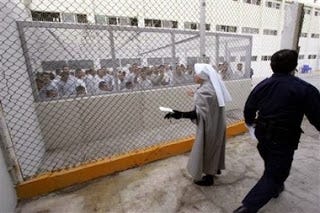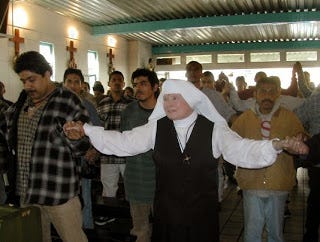The Little Way of Mother Antonia

On October 17, 2013, just a few months ago, Mother Antonia Brenner died in Tijuana, Mexico. Mother Antonia was 86.
Born on December 1, 1926 as Mary Clarke Mother Antonia grew up wealthy in Hollywood. She eventually took over and ran her father's business after his death.
Married twice and divorced twice (her last name Brenner is from her second husband) Mary Brenner had seven children. Living in Beverly Hills after her second divorce and her children grown Mary Brenner--after years of Hollywood socialite charity work--decided to devote her life fully to God.
But no religious order would take a forty-something, twice divorced, grandmother. So on March 19, 1977 Mary Brenner decided to take matters into her own hands. If no order would take her she'd go it alone. That morning she put on a black dress and a homemade veil and became Sister Antonia, naming herself after Father Anthony Brouwers, the Catholic priest who had been Mary's spiritual confidant and partner in charity efforts before his death in 1964.
Having donned her make-shift habit Sister Antonia went to church and made personal vows of obedience, chastity, fidelity and service.
And then she drove south to Tijuana to begin her life living in a prison cell alongside the inmates of the notorious La Mesa prison.

Mother Antonia had been visiting La Mesa for years. And during that time she increasingly came to believe that God was calling her to live in that dark, violent and brutal place to minister to the prisoners and guards of La Mesa. Eventually, Mother Antonia became known as "the Prison Angel."
From her cell in La Mesa Mother Antonia cared for sick and dying prisoners. She brought food, medicine and dental care for the poorest of the inmates. She fought in courts for those wrongfully imprisoned. She buried the prisoners who died without family. She tirelessly spoke out against the torture and harsh treatment of inmates. And she loved and cared for the guards as much as she loved the prisoners, spending untold hours holding their hands, listening to their problems, offering advice and spiritual counsel.
No one was beyond the love and embrace of La Madre.
She had such respect that she could walk into the middle of violent prison riots and shut them down. When the men saw La Madre in their midst they threw their guns out the window.
And every night she went back to her cell to sleep in the exact same conditions of those she cared for.
By the time of her death Mother Antonia was recognized worldwide as a living saint.
You can read more about Mother Antonia's amazing life here in a NY Times tribute honoring her passing. You can read the fuller story of her life in the biography The Prison Angel written by two Pulitzer prize winning journalists.
Mother Antonia's life is, quite literally, heroic. Awe-inspiring.
And that feeling can leave most of us looking in from the outside. Mother Antonia is an inspiring figure. Perhaps too inspiring. Can any of us do what she did?
As I came to the end of reading The Prison Angel I was struggling with that exact question. But the book ended by pointing to the Little Way. From the concluding chapter of The Prison Angel:
Mother Antonia looks back over her prison years with no regrets and the fondest of memories. "I have not had a day of depression in twenty-seven years," she says. "I have been upset, angry, and sad, but never depressed or regretful, because I have a reason for living."
She sees unhappy people all around her and thinks it doesn't need to be that way. She says happiness is everywhere, all around us, all the time, if we choose to look for it. One day as she was making peanut butter and jelly sandwiches to take to prisoners she paused with a puzzled look on her face.
"You know," she said, "people think what I do is so extraordinary. But look at me; what am I doing? Anyone can do it. There are so many things people can do. It doesn't have to be enormous. It's the little things. Anyone can make a sandwich."



